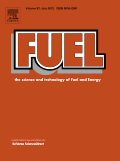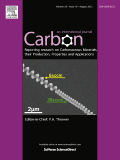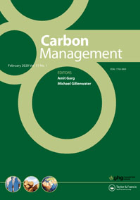
Boletin del grupo espanol del carbon
Scope & Guideline
Advancing Carbon Science for a Sustainable Future
Introduction
Aims and Scopes
- Carbon Material Synthesis and Characterization:
The journal emphasizes the development and characterization of various carbon-based materials, including activated carbons, carbon nanotubes, and graphene, for diverse applications. This includes innovative methods for synthesizing these materials and understanding their properties. - Energy Applications of Carbon Materials:
Research on the use of carbon materials in energy-related applications, such as catalysis, energy storage (like batteries), and hydrogen production, is a core focus. The journal publishes studies on improving the efficiency and sustainability of these technologies. - Biomass Valorization and Waste Utilization:
There is a consistent emphasis on the conversion of biomass and waste into valuable carbon products. This includes studies on pyrolysis, biogas conversion, and the development of bio-based materials, highlighting the journal's commitment to sustainable practices. - Environmental Remediation:
The journal covers the application of carbon materials in environmental fields, particularly in water purification and remediation strategies. This includes research on activated carbon's effectiveness in removing pollutants and enhancing water quality. - Nanotechnology and Carbon Nanomaterials:
The integration of nanotechnology with carbon materials is a significant theme, focusing on the development and application of carbon nanostructures for advanced technological solutions, including biomedical applications and photocatalysis.
Trending and Emerging
- Sustainable Biomass Conversion:
There is a notable increase in research focused on converting biomass into carbon-based products, emphasizing sustainability and circular economy principles. This trend aligns with global efforts to reduce waste and enhance resource efficiency. - Advanced Carbon Nanomaterials:
The emergence of engineered carbon nanomaterials for various applications, including energy storage, catalysis, and biomedical uses, is becoming a significant focus. This reflects the growing interest in nanotechnology and its potential to revolutionize multiple industries. - Interdisciplinary Approaches to Carbon Research:
The journal is increasingly publishing works that integrate carbon research with other scientific disciplines, such as biology and materials science. This interdisciplinary approach is crucial for addressing complex challenges in energy, health, and environmental sustainability. - Carbon Materials in Environmental Applications:
Research into the use of carbon materials for environmental remediation, particularly in water purification and pollutant removal, has seen a rise. This reflects the urgent need for sustainable solutions to environmental challenges. - Electrocatalysis and Energy Conversion:
The trend towards developing high-performance electrocatalysts for energy conversion processes, such as water electrolysis and CO2 reduction, indicates a growing focus on renewable energy technologies and carbon neutrality.
Declining or Waning
- Traditional Coal Utilization:
Research related to traditional coal extraction and utilization appears to be decreasing, likely due to a global shift toward sustainable energy solutions and the decreasing relevance of coal in energy production. - Basic Research on Carbon Chemistry:
There seems to be a waning interest in fundamental studies of carbon chemistry, as the journal increasingly focuses on applied research and technological advancements rather than basic theoretical investigations. - Conventional Carbon Capture Techniques:
While carbon capture remains a critical area of research, traditional methods may be seeing less emphasis as newer, more innovative approaches are being explored, such as integrating carbon capture with other technologies like hydrogen production.
Similar Journals

Membranes
Exploring innovations in filtration and separation technologies.Membranes, published by MDPI since 2011, is an esteemed open access journal dedicated to advancing the field of membrane science and technology. With an E-ISSN of 2077-0375, this journal serves as a vital platform for researchers and professionals from various disciplines such as chemical engineering, filtration, and separation technologies. Holding a commendable Q2 ranking in Chemical Engineering (miscellaneous) and notable placement in filtration and process chemistry categories, it provides a robust framework for researchers to disseminate groundbreaking findings. The journal's commitment to open access ensures a wide-reaching impact, allowing for unrestricted sharing of high-quality research that addresses the critical challenges and innovations in membrane technology. Situated in Switzerland, Membranes is not only a cornerstone for academic inquiry but also a leading resource for students and industry experts seeking cutting-edge developments in their fields.

Fuel
Exploring the Future of Energy EngineeringFuel is a premier international journal published by Elsevier Science Ltd, showcasing critical advancements and insights in the fields of chemical engineering, energy engineering, power technology, and organic chemistry. With a significant history dating back to 1922 and continuous publication from 1970 to 2025, Fuel holds an impressive position in the academic community, reflected in its top-tier rankings—Q1 in multiple categories including Fuel Technology and Chemical Engineering for the year 2023. This journal is dedicated to exploring innovative research and application of fuel technologies, driving forward the dialogue on sustainable energy solutions. Researchers and professionals alike will find Fuel to be an essential resource, providing access to high-impact articles that contribute to advancements in methodologies and applications, while navigating the complexities of global energy challenges.

International Journal of Electrochemical Science
Pioneering discoveries in the realm of electrochemical sciences.International Journal of Electrochemical Science is a peer-reviewed journal dedicated to disseminating cutting-edge research in the field of electrochemistry. Published by Elsevier in Serbia, this journal serves as a vital platform for scientists and researchers to explore innovative electrochemical techniques, processes, and applications. With an ISSN of 1452-3981, it has been a respected source of scholarly articles since its inception in 2006 and continues to bridge the gap between theoretical advancements and practical implementations up until 2024. Notably, it holds a Q4 quartile ranking in the field of electrochemistry and ranks 41 out of 60 in the Scopus database, situating it within the 32nd percentile among its peers. The journal champions open academic discourse, contributing significantly to the advancement of knowledge in electrochemical sciences, making it an essential resource for researchers, professionals, and students alike who are striving towards new discoveries and innovations.

CARBON
Fostering Excellence in Carbon ResearchCARBON is a leading peer-reviewed journal published by PERGAMON-ELSEVIER SCIENCE LTD, focusing on the realms of Chemistry and Materials Science. With an impressive impact factor, CARBON is ranked within the top quartile (Q1) of both fields in the 2023 Scimago Journal Rank, remarkably securing the 18th position out of 463 in General Materials Science and the 22nd position out of 408 in General Chemistry. Since its inception in 1963, the journal has been dedicated to publishing high-quality research that advances the understanding of carbon-based materials and their applications. Operating from the United Kingdom, CARBON provides an essential platform for researchers, professionals, and students alike to disseminate their findings and innovations. Although not an open-access journal, it offers access options that maintain the integrity and high standards of academic publishing. As a critical resource in its field, CARBON continues to foster scientific dialogue and development, significantly impacting current and future research.

C-Journal of Carbon Research
Leading the Charge in Carbon Innovations and Environmental SolutionsC-Journal of Carbon Research is an innovative and dynamic journal published by MDPI, situated in the picturesque city of Basel, Switzerland. Launched in 2015 and operating under an Open Access model, the journal aims to promote the dissemination of high-quality research related to carbon science, environmental sustainability, and renewable resources. With a current impact factor reflecting its growing influence in the field, the journal's standing is bolstered by its Scopus ranking, placing it in the 37th percentile in the Environmental Science category. It offers a platform for researchers, professionals, and students alike to engage with cutting-edge studies, reviews, and discussions that contribute to environmental science advancements. As the journal continues its convergence journey from 2022 to 2024, it remains committed to fostering scholarly exchange and interdisciplinary collaboration on pressing carbon-related challenges.

Carbon Energy
Transforming energy research into impactful solutions.Welcome to Carbon Energy, an esteemed open-access journal published by WILEY that focuses on cutting-edge research in the field of energy and materials science. Since its inception in 2019, this journal has quickly established itself as a leading platform for disseminating impactful findings and innovations related to carbon-based energy solutions, renewable resources, and sustainability practices. With its impressive Q1 rankings in multiple categories—including Energy (miscellaneous), Materials Chemistry, and Renewable Energy—Carbon Energy is recognized for delivering high-quality, peer-reviewed content that meets the rigorous standards of the academic community. Through its open-access model, the journal ensures wide accessibility of research findings, making it an invaluable resource for researchers, professionals, and students alike. As we look toward the future, Carbon Energy aims to further its mission of advancing sustainable energy technologies and promoting interdisciplinary collaboration in tackling global energy challenges.

Energy Material Advances
Shaping the Landscape of Renewable Energy ResearchEnergy Material Advances, published by the American Association for the Advancement of Science, stands at the forefront of energy research, showcasing groundbreaking studies in the realm of renewable energy, fuel technology, and materials science. With the journal's commitment to open access since 2020, it aims to democratize knowledge and foster innovation across a global community of researchers, professionals, and students. The journal boasts an impressive impact factor, placing it firmly within the Q1 category across multiple disciplines including Energy (miscellaneous), Fuel Technology, and Renewable Energy, Sustainability and the Environment, highlighting its significance in advancing scholarly discussions. In the latest Scopus rankings, Energy Material Advances ranks among the top 10% of journals in its field, affirming its role as a pivotal resource for current and emerging trends in energy materials. The journal is dedicated to facilitating collaborative efforts and inspiring novel approaches to the challenges posed by energy sustainability and technological advancement.

Carbon Management
Uniting Voices for a Sustainable Carbon FutureCarbon Management, published by TAYLOR & FRANCIS LTD, stands at the forefront of research in the dynamic field of environmental science, particularly focusing on strategies and policies for effective carbon management in the context of climate change. With an ISSN of 1758-3004 and E-ISSN of 1758-3012, this esteemed journal has been an Open Access platform since 2022, allowing for greater dissemination of knowledge and engagement with crucial carbon-related issues. Housed in the United Kingdom, it boasts a commendable impact factor as evidenced by its Q2 ranking in Environmental Science (miscellaneous) and a notable Scopus rank of #65 out of 233 in General Environmental Science, placing it in the 72nd percentile among its peers. The journal's scope encompasses a broad range of topics, ensuring that it serves as a vital resource for researchers, professionals, and students alike, facilitating the exchange of innovative ideas and practices from 2010 to the present. By prioritizing open access, Carbon Management enhances visibility and impact in the pursuit of sustainable solutions for our planet's carbon challenges.

Carbon Capture Science & Technology
Shaping a Greener Future: Insights into Carbon Capture ScienceCarbon Capture Science & Technology, published by Elsevier, is an esteemed, peer-reviewed, open access journal dedicated to advancing research in the growing fields of chemical engineering, energy, and environmental science. With an ISSN of 2772-6568, this influential journal has established itself since its inception in 2021 and continues to make notable contributions, reflected in its impressive Q1 rankings across multiple categories, including a #14 rank in Environmental Science and a #13 rank in Chemical Engineering as of 2023. The journal aims to provide a platform for the dissemination of innovative carbon capture technologies and methodologies that address vital climate challenges, ensuring broad accessibility for researchers, professionals, and students alike. By embracing open access, Carbon Capture Science & Technology fosters a collaborative approach to knowledge sharing, making it an indispensable resource for those committed to sustainability and environmental preservation.

Solid Fuel Chemistry
Transforming Knowledge into Energy InnovationsSolid Fuel Chemistry is a pivotal journal published by PLEIADES PUBLISHING INC, dedicated to advancing knowledge in the fields of chemical engineering, chemistry, and fuel technology. With its ISSN 0361-5219 and E-ISSN 1934-8029, this esteemed publication has been contributing to the scientific community since its inception, covering extensive research from 1975 to 2024. Operating within the Q3 and Q4 quartiles, it holds a significant position among peers in its categories, ranked 94th in Energy & Fuel Technology and 212th in General Chemical Engineering. Although it lacks an open access option, the journal remains a vital resource for researchers, professionals, and students eager to explore innovative developments in solid fuels and their applications. The articles published in Solid Fuel Chemistry provide essential insights, facilitate collaboration, and inspire further research, making it an indispensable platform for anyone engaged in this essential field of study.